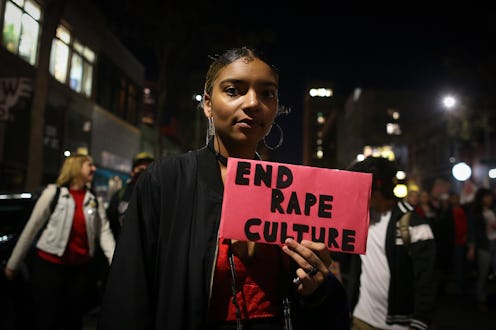While most people look down upon advocating sexual assault, there are some places where such speech gets written off as merely a joke (or "locker room talk," as Donald Trump would call it). New research on sexism in men's magazines published in Psychology of Men and Masculinity shows that these magazines are one such place where misogyny is frequently made light of. A series of three experiments found that sexist jokes found in "lads' mags" are not merely ironic, men who read them exhibit more sexist attitudes, and some excerpts from them are actually indistinguishable from things said by convicted rapists.
For the first experiment, the researchers asked 81 men ages 18 to 50 in the UK how they interpreted jokes within and outside the context of lads' mags — that is, men's magazines featuring erotic photographs of women. They found that people didn't take them any more ironically when they were in magazines than they did otherwise. However, they did consider them less hostile, which means including sexist jokes in magazines may lead them to slide under the radar.
The second study also supported the idea that men's magazines could encourage sexism. 423 men ages 18 to 30 in the UK were asked about their consumption of lads' mags and their attitudes toward women. The more sexism they displayed, the more likely they were to buy these magazines.
But the third study was perhaps the most disturbing. 274 U.S. college students were asked to classify which quotes were from men's magazines and which came from convicted rapists. They were only able to guess correctly about half the time. To give you an idea of what the quotes from men's magazines sounded like, they included statements like, "You do not want to be caught red-handed … go and smash her on a park bench. That used to be my trick," "If the girl you’ve taken for a drink won’t spread for your head, think about this mathematical statistic: 85 percent of rape cases go unreported," and, "The possibility of murder does bring a certain frisson to the bedroom."
Fortunately, though, when people took part in this task and observed how similar these two kinds of quotes sounded, they were less likely to take the magazines seriously. So, perhaps by educating people on how the way we talk about women — even in seemingly unimportant places like lads' magazines — really does contribute to sexism, we can make them less likely to consume this kind of media.
We saw something similar happen when a Society Pages post by Sezin Koehler pointed out the similarities between things people's rapists had said to them and lyrics from the song "Blurred Lines." Once people can see the connection between words in jokes or song lyrics and words that actively promote sexual violence, they're less likely to dismiss them.
While it might not be direct or tangible, there is a connection between what we hear, see, and read in the media and what sorts of behaviors are considered socially acceptable. Through this connection, magazines and songs can contribute to rape. And considering the words they contain merely ironic or humorous only serves to push their impact under the rug.
Image: Giphy (3)
